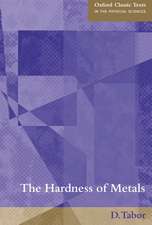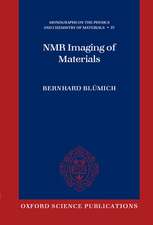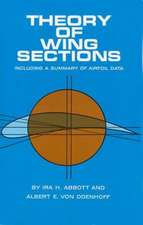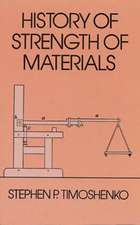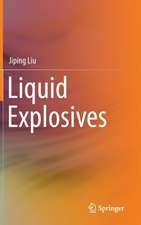Experimental Techniques in Materials and Mechanics
Autor C. Suryanarayanaen Limba Engleză Hardback – 27 iun 2011
The text focuses on crystal structure determination, optical and scanning electron microscopy, phase diagrams and heat treatment, and different types of mechanical testing methods. Each chapter follows a similar format:
- Discusses the importance of each technique
- Presents the necessary theoretical and background details
- Clarifies concepts with numerous worked-out examples
- Provides a detailed description of the experiment to be conducted and how the data could be tabulated and interpreted
- Includes a large number of illustrations, figures, and micrographs
- Contains a wealth of exercises and references for further reading
Preț: 1013.39 lei
Preț vechi: 1235.84 lei
-18% Nou
Puncte Express: 1520
Preț estimativ în valută:
193.91€ • 203.00$ • 160.45£
193.91€ • 203.00$ • 160.45£
Carte tipărită la comandă
Livrare economică 05-19 aprilie
Preluare comenzi: 021 569.72.76
Specificații
ISBN-13: 9781439819043
ISBN-10: 1439819041
Pagini: 468
Ilustrații: 229 black & white illustrations, 41 black & white tables
Dimensiuni: 156 x 234 x 25 mm
Greutate: 0.83 kg
Ediția:New.
Editura: CRC Press
Colecția CRC Press
Locul publicării:Boca Raton, United States
ISBN-10: 1439819041
Pagini: 468
Ilustrații: 229 black & white illustrations, 41 black & white tables
Dimensiuni: 156 x 234 x 25 mm
Greutate: 0.83 kg
Ediția:New.
Editura: CRC Press
Colecția CRC Press
Locul publicării:Boca Raton, United States
Public țintă
Undergraduate students in materials science and engineering or mechanical engineering; practicing materials scientists, engineers, and technicians.Cuprins
Introduction. X-Ray Diffraction. Optical Microscopy. Scanning Electron Microscopy. The Iron–Carbon Phase Diagram and Microstructures of Steels. Heat Treatment of Steels. Hardenability of Steels. Hardness Testing. Tensile Testing. Impact Testing. Fatigue Testing. Creep Testing. Index.
Notă biografică
C. Suryanarayana is a professor of materials science and engineering in the Department of Mechanical, Materials and Aerospace Engineering at the University of Central Florida. Dr. Suryanarayana is a fellow of ASM International and the Institute of Materials, Minerals and Mining (UK). He has published over 330 technical papers and according to Thomson Reuters, is one of the top 40 materials scientists with the highest citation impact scores for papers published since 2000. His research focuses on rapid solidification processing, mechanical alloying, innovative synthesis/processing techniques, metallic glasses, superconductivity, quasicrystals, and nanostructured materials.
Recenzii
This book covers the main characterization tools for materials mechanics, phase analysis by x-ray diffraction and microstructure analysis in a comprehensive and exhaustive way. In addition, steel is presented as a practical example, covering phase transitions and common heat treatments. [It is] easy to read and understand for a beginner’s level, including examples and questions for practicing and control.
—Thomas Klassen, Helmut-Schmidt-University Hamburg, Germany
... beneficial for undergraduate students in developing their concepts related to the experimental techniques in materials and mechanics.
—Soon-Jik Hong, Kongju National University
—Thomas Klassen, Helmut-Schmidt-University Hamburg, Germany
... beneficial for undergraduate students in developing their concepts related to the experimental techniques in materials and mechanics.
—Soon-Jik Hong, Kongju National University
Descriere
Bridging the gap between lecture and lab, this text provides a detailed yet easy-to-follow treatment of various techniques useful for characterizing the structure and mechanical properties of materials. With an emphasis on techniques most commonly used in laboratories, the book enables readers to understand practical aspects of the methods and derive the maximum possible information from the experimental results. Background information and essential concepts are explained in an easy-to-understand way. Along with numerous illustrations and micrographs, each chapter includes worked-out examples, lab experiments, exercises, and references.

